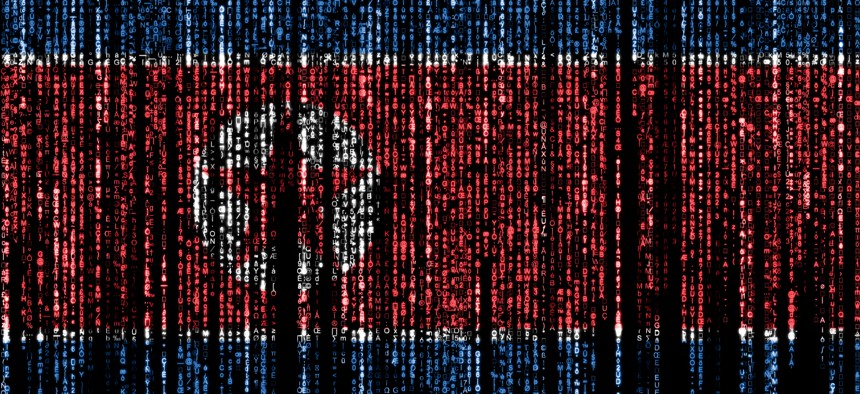North Korea's cyber-enabled sanction evasion requires tougher response, lawmakers and experts say

Gwengoat/Getty Images
Pyongyang’s growing reliance on cybercrimes to circumvent international sanctions should push the U.S. and its allies to fully enforce existing sanctions and review whether more regulations are needed to govern digital currencies.
North Korea’s reliance on cyberattacks to fund its illicit activities requires a more robust response from the U.S. and international community, lawmakers and experts said on Thursday, including more rigorous enforcement of current sanctions and a review of the regulatory framework surrounding cryptocurrencies.
During a House Foreign Affairs Subcommittee on the Indo-Pacific hearing — which was held on the 70th anniversary of the armistice agreement that ended the Korean War — lawmakers and experts said that international sanctions were not doing enough to stymie North Korea’s nuclear program or bring its leader, Kim Jong Un, to the negotiating table because of the country’s massive reliance on digitally pilfered funds.
Rep. Young Kim, R-Calif. — the subcommittee’s chair — noted that “North Korea is one of the most heavily sanctioned countries in the world,” which requires it to depend on cybercrimes and other illicit activities “to fund its human rights abuses and its nuclear program.”
“If we want to see the Kim regime fail in its illegal ventures, then we must ensure that we enhance our sanctions and law enforcement activities targeting North Korea's cybercrime,” she added.
Many of these activities, she noted, are conducted by hackers located outside of North Korea — particularly in China — which helps provide Pyongyang “with the digital infrastructure it needs to carry out these attacks.”
North Korea’s reliance on funding from cybercrimes has continued to increase in recent years, almost reaching parity with the country’s more traditional revenue streams. In 2022, Pyongyang's total trade with China — its top international trading partner — was roughly $1.6 billion. In the same year, cybercriminals linked to North Korea stole an estimated $1.7 billion in cryptocurrencies alone.
The Cybersecurity and Infrastructure Security Agency noted in a 2020 report that, “as of late 2019,” hackers associated with Pyongyang had attempted to steal almost $2 billion “from financial institutions through increasingly sophisticated tools and tactics.”
Bruce Klingner — the senior research fellow for Northeast Asia at the Heritage Foundation's Asian Studies Center — said cybercrimes are particularly beneficial to Pyongyang because they can be used “in ways that are more efficient, less risky and far more lucrative than its past illicit activities.”
“The U.S. has estimated that in the last two years alone, North Korea has largely funded its weapon of mass destruction programs through cyber heists of cryptocurrencies and hard currencies,” he noted.
And while the international community has imposed a broad range of economic and financial sanctions on North Korea over the past decade-plus to push the country away from its nuclear ambitions, experts said they have not been effectively enforced or strengthened to fully account for the nation’s reliance on cybercrimes to fund its activities.
“We've imposed $9 billion in fines on European banks for money laundering for Iran, but $0 in fines on Chinese banks for doing the same for North Korea,” Klingner said.
Rep. Andy Barr, R-Ky., noted that the fiscal year 2020 National Defense Authorization Act included his legislation imposing strict secondary sanctions on financial institutions that do business “with virtually anyone” that trades with Pyongyang.
He said the sanctions give banks a clear option: “they can do business with North Korea, or they can have access to the U.S. financial system, but they can't do both.”
But Barr said “we see no action” being taken to enforce these measures, particularly when it comes to “Chinese and other foreign banks facilitating the illicit finance of this regime.”
“That is a powerful tool in our quiver, and it is not being used,” Barr said. “And Congress has authorized the Treasury Department to utilize this tool, and they're sitting on their hands over there.”
Rep. Brad Sherman, D-Calif., also criticized the “weak-ass sanctions” imposed on North Korea, saying they may be an inconvenience to the Kim regime “but not enough to change their nuclear or other policies.”
He said lawmakers should also consider taking additional regulatory steps to crack down on North Korea’s ability to steal via alternate currencies without worrying about their ill-gotten gains being easily repatriated by financial institutions or traced back to hackers’ digital wallets.
Given North Korea’s strong focus on cryptocurrencies, Sherman said he had serious concerns about further deregulating digital currencies and pondered whether North Korea would particularly benefit “if cryptocurrency was a real currency.”
Klingner said “it may be a way for them to facilitate commerce without being reliant on the centrality of the U.S. dollar to the international financial system,” adding that “if they can do it in cyber, it's a way of evading that form.”






